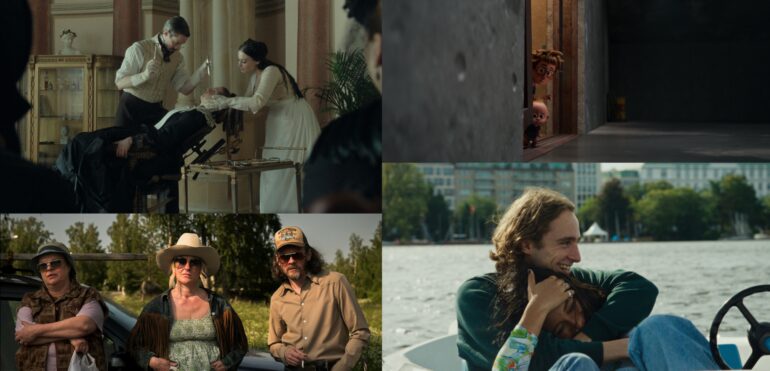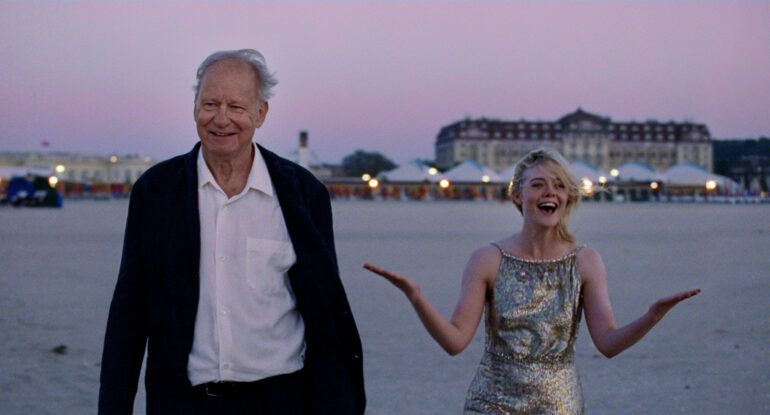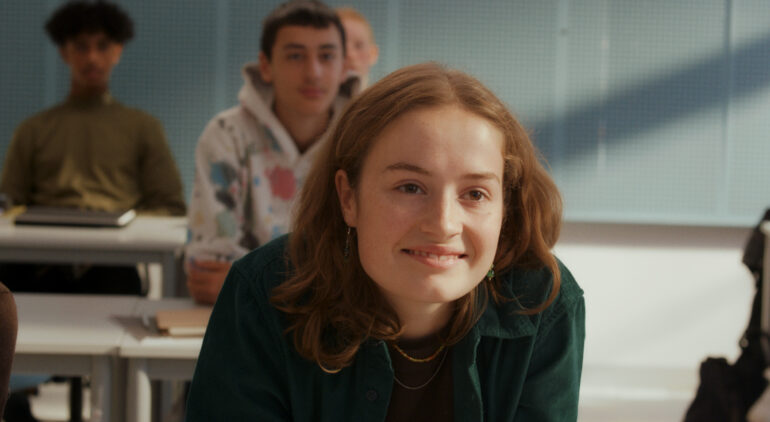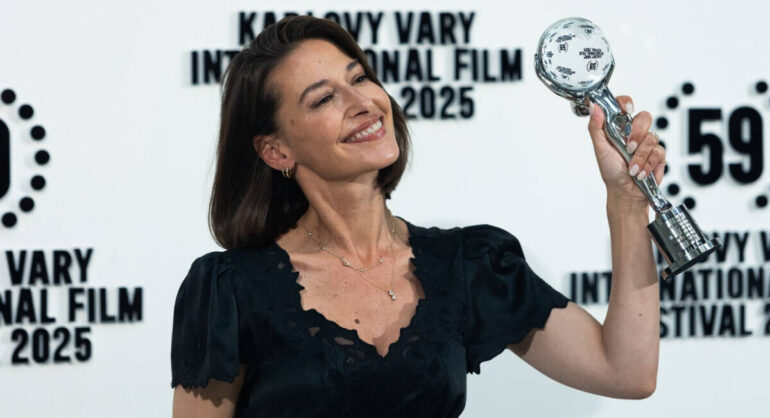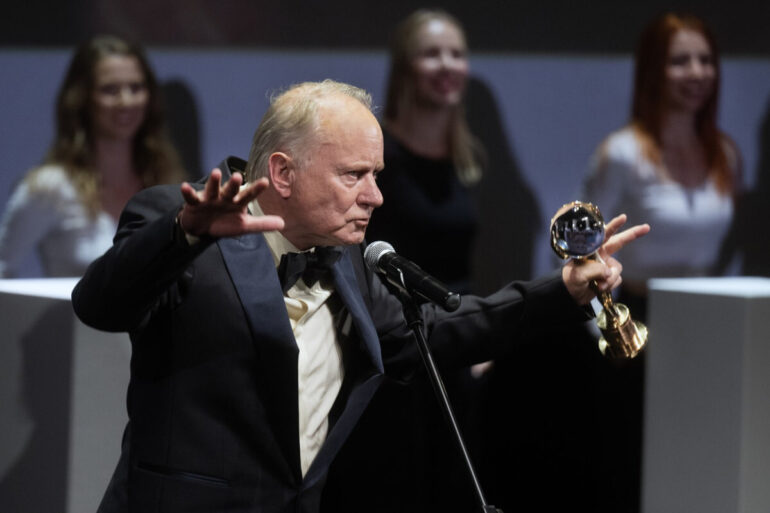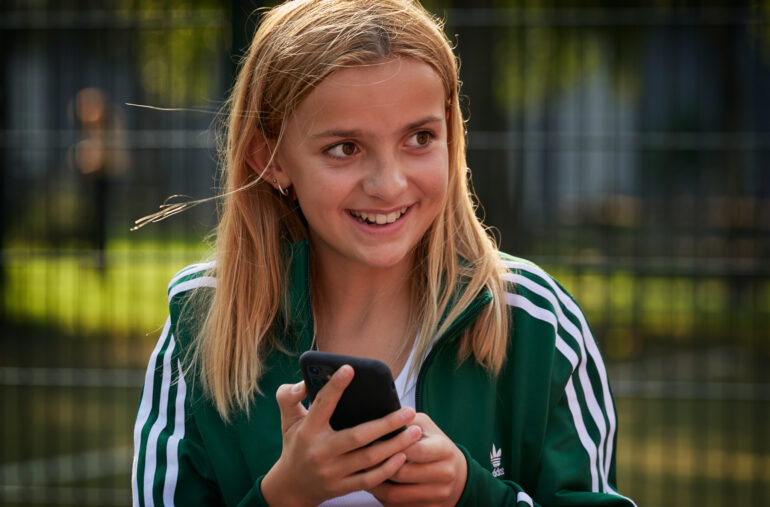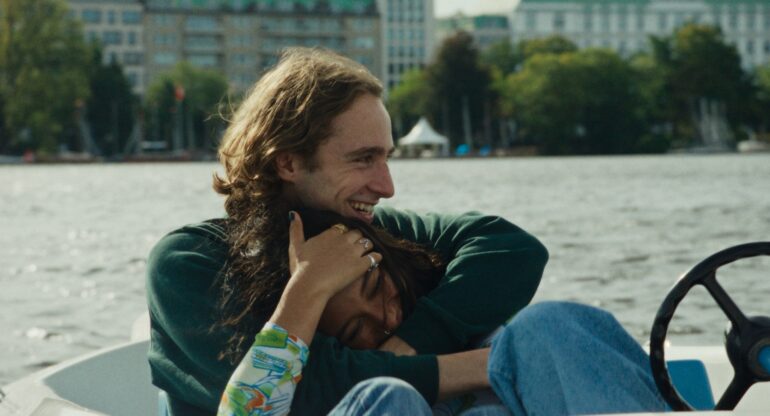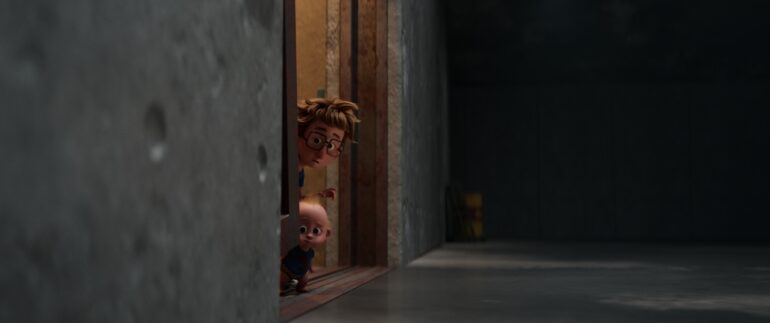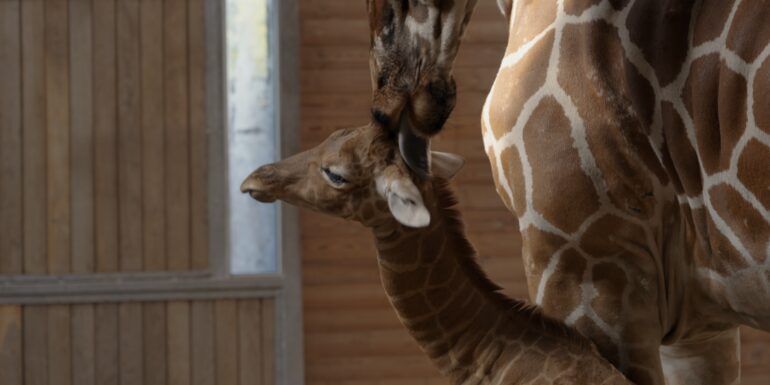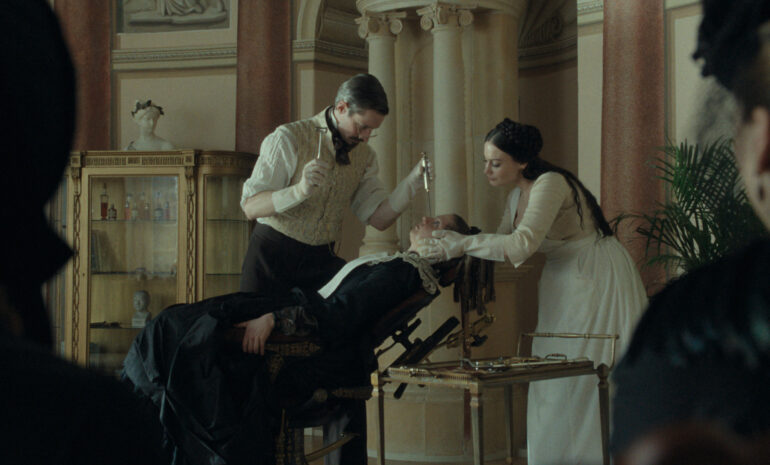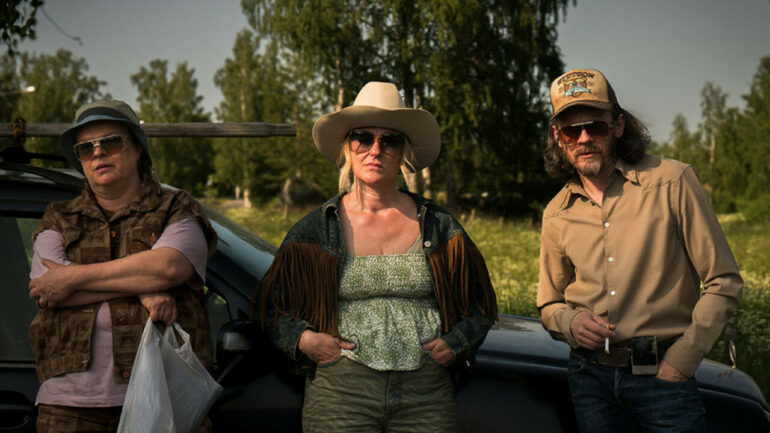Written by: Aleksander Huser
11.08.25
We present a selection of Nordic news that took place while NFTVF’s office was closed – from international awards and Nordic festival themes to Academy Award invitees.
Nordic films, and more precisely vintage Nordic Noir, took central stage at the world’s leading heritage film festival, Il Cinema Ritrovato in Bologna June 21-29, where seven newly restored Scandinavian classics from the 40s and 50s were screened in the film series “Norden Noir”. Behind this first joint Nordic initiative at the festival were the film institutes of Denmark, Sweden and Norway, with their respective national cinematheques curating the selection.
Presented as the cinematic forerunners of the popular Nordic noir TV genre, the series included three Danish, two Swedish and two Norwegian films: Murder Melody (Mordets melodi) (directed by Bodil Ipsen, Denmark, 1944), John and Irene (John og Irene) (dir. Asbjørn Andersen and Anker Sørensen, Denmark, 1949), Two Minutes Late (To minutter for sent) (Torben Anton Svendsen, Denmark, 1952), Girl with Hyacinths (Flicka och hyacinter) (Hasse Ekman, Sweden, 1950), In the Mist (Dimma dold) (Lars-Eric Kjellgren, Sweden, 1953), Death Is a Caress (Døden er et kjærtegn) (Edith Carlmar, Norway, 1949) and Eight O’Clock Sharp (På slaget åtte) (Nils R. Müller, Norway, 1957). Following the screenings in Bologna, the Norden Noir film series is set to tour Scandinavian cinematheques.
Further Nordic cooperation is to be found in the new script development programme Nordic NEST, initiated by the MOIN Film Fund Hamburg Schleswig-Holstein in collaboration with the pan-Nordic platform The Five Nordics (consisting of the Danish Film Institute, the Finnish Film Foundation, the Icelandic Film Centre, the Norwegian Film Institute, and the Swedish Film Institute), and supported by the German Federal Film Board (FFA). Nordic NEST builds on the foundation laid by the original NEST (“New Endeavours in Storytelling”) programme after its successful first year run. In the coming months, producers and screenwriters from Germany and the Nordic countries will meet to collaborate on new ideas for feature films and series, with the best projects receiving up to 80,000 Euros in script development support. Applications are now open for Nordic and German producers of feature films or high-end drama series for the Nordic NEST Kick-off at Filmfest Hamburg Industry Days 2025.
At the Norwegian Film Institute, Kjersti Mo has been reappointed as CEO for a second term. She entered the position in 2019, and will now continue helming the Institute through 2031. With Dag Johan Haugerud’s Dreams (Drømmer) winning the Golden Bear at the Berlinale and Sentimental Value (Affeksjonsverdi) by Joachim Trier the Grand Prix in Cannes this year, as well as other prominent awards and nominations, Norwegian film is presently enjoying tremendous international success. “We are in a golden age of Norwegian cinema, and we must harness this momentum,” Mo states in the NFI’s news release.
Moving over to the USA, although keeping with Norwegian films, Benjamin Ree’s The Remarkable Life of Ibelin (Ibelin) is nominated for an Emmy in the category “Exceptional Merit in Documentary Filmmaking”, competing with the films I Am: Celine Dion and Patrice: The Movie. The feature doc tells the truly remarkable story of Mats Steen, who died of a degenerative muscular disease at the age of 25, recreating the rich life he lived through an online gaming community. The Remarkable Life of Ibelin is produced by Ingvil Giske for Norwegian production company Medieoperatørene, and has won several international and national awards since it world premiered at last year’s Sundance festival, where it took two prizes and was acquired by Netflix. The Creative Arts Emmy Awards will take place on Saturday, September 6 and Sunday, September 7 at the Peacock Theater in Los Angeles.
Furthermore, The Remarkable Life of Ibelin director Ree is among the 534 artists and executives invited this year to join the Academy of Motion Picture Arts and Sciences. Two other Nordic documentary professionals have received the invitation as well: Danish director Lea Glob (Apolonia, Apolonia and Venus) and Norwegian producer Mette Cheng Munthe-Kaas (Hidden Letters, Nowhere to Hide).
Among the Academy invitees in the director category is Magnus von Horn, whose latest feature The Girl with the Needle (Pigen med nålen) (Denmark/Poland/Sweden) was nominated for this year's Academy Awards for Best International Feature Film. The Swedish director is also invited as a writer (and will have to select one of these branches upon accepting the membership), together with Norwegian screenwriter Mona Fastvold (who received an Oscar nomination for The Brutalist) and Danish writer Line Langebek (The Girl with the Needle). Other Nordic professionals invited to join the organisation in this round are Finnish producer Jussi Rantamäki, Danish animator Sandra Norup Andersen, Icelandic costume designer Margrét Einarsdóttir, and Finnish foley artist and sound designer Heikki Kossi.
At the Karlovy Vary International Film Festival, which saw its 59th edition in the picturesque Czech city from July 4 to 12, Norwegian Pia Tjelta won the Best Actress Award for her leading role in Nina Knag’s feature debut Don’t Call Me Mama (Se meg). In this intense and suspenseful drama, the popular actress portrays a teacher and wife of the local mayor in a small Norwegian city who starts an affair with a much younger asylum seeker, with potentially devastating consequences for both herself and her lover. Don’t Call Me Mama is produced by The Global Ensemble Drama in co-production with Screen Story, both from Norway.
Karlovy Vary’s Best Actress Award went to a Norwegian actress last year as well, when Helga Guren received the same prize for her role in Loveable (Elskling) by Lilja Ingolfsdottir. In her turn, Guren followed male Norwegian actor Herbert Nordrum, who won the Best Actor Award at Karlovy Vary in 2023 for the Swedish majority production The Hypnosis (Hypnosen), directed by Ernst De Geer and co-produced by Norway and France.
In addition to several national awards, Tjelta has earlier won Best Actress at San Sebastián in 2018 for Tuva Novotny’s Blind Spot (Blindsone). Don’t Call Me Mama will have its national premiere in director Knag’s hometown Bergen on October 15, when it opens the 26th Bergen International Film Festival.
Also at this year’s Karlovy Kary fest, Lithuanian director and cinematographer Vytautas Katkus was awarded Best Director for his directorial feature debut The Visitor (Svečias), which lists both Norway and Sweden as co-producing countries. The prize was shared «ex aequo» with French director Nathan Ambrosioni for his feature Out of Love (Les Enfants vont bien).
And not least, Swedish veteran actor Stellan Skarsgård received the festival’s Crystal Globe for Outstanding Artistic Contribution to World Cinema, an award that counts legendary actress and director Liv Ullmann among its previous recipients. During his visit to Karlovy Vary, Skarsgård gave a masterclass under the label “KVIFF Talk”, as well as introducing the screening of Sentimental Value together with fellow cast member Inga Ibsdotter Lilleaas. In just a few days from now, Skarsgård will be feted with an additional honorary award at the 31st Sarajevo Film Festival, where he is to receive the Honorary Heart of Sarajevo.
Two Nordic films won top awards at the Giffoni Film Festival in Italy, which ran its 55th edition July 17-26. The winners at the festival devoted to cinema for children and young audiences were voted on by a jury of over 5,000 young people from 30 countries, with Super Charlie (Sweden/Denmark) by Jon Holmberg winning the Gryphon Award for the Elements +6 section. This animated feature inspired by Camilla Läckberg’s popular children’s books tells the story of ten-year-old Wille who dreams of becoming a superhero, only to discover that his newborn baby brother Charlie has superpowers. But when a supervillain and a mad scientist launch an evil plan, the brothers have to team up as a super duo.
In the Elements +10 section, the award went to the Danish fiction feature Honey, directed by Natasha Arthy, about a shy 13-year-old who hides the truth about her chaotic family and secretly loves playing music. When the protagonist Honey learns that her music-loving grandfather might be alive after all, she hopes that he can help, and sets out to find him.
Some weeks prior to the Giffoni fest, Honey won the Golden Slipper for Best Feature Film in the Children’s Category at Zlin International Children’s Film Festival. At the same festival in the Czech Republic, Swedish feature Kevlar Soul (Kevlarsjäl) by Maria Eriksson-Hecht took the award for Best Feature Film in the Youth Category, as well as the Ecumenical Jury Award.
Finnish director Teemu Nikki’s beer-soaked comedy 100 Litres of Gold (100 litraa sahtia), which premiered in the main competition at last year’s Tallinn Black Nights Film Festival, won the Gorki List Audience Award at the European Film Festival Palić. The 32nd edition of the Serbian festival took place from July 19 to 23.
At the Bucheon International Fantastic Film Festival (BIFAN) in South Korea, Norwegian Emilie Blichfeldt’s debut feature The Ugly Stepsister (Den stygge stesøsteren) (Norway/Sweden/Poland/Denmark) took both the Best of Bucheon Award for best feature in the international competition and the audience award in the same section. The satirical body-horror retelling of the classical Cinderella fairy tale from the stepsister’s perspective premiered at Sundance’s Midnight Section in January, allegedly to some highly physical reactions amongst audiences. The Bucheon festival, which ran from July 3 to 13, opened with About a Hero (Denmark/Germany/USA), Piotr Winiewicz’s hybrid doc with a screenplay generated by AI, inspired by the works of Werner Herzog.
Life and Other Problems (Livet og andre problemer) (Denmark/Sweden/UK) by Max Kestner won the award for Best Feature Doc at the TerraLenta Film Fest, a festival dedicated to environmental documentaries, which held its very first edition in Pignola, Italy, July 23-27. Life and Other Problems premiered at last year’s CPH:DOX, and follows Danish filmmaker Kestner on a journey around the world to find answers to some big philosophical questions, with the killing of a young giraffe from Copenhagen as starting point.
Dreams, Sentimental Value, Apolonia, Apolonia, The Girl with the Needle, The Hypnosis, Super Charlie, Honey, Kevlar Soul, The Ugly Stepsister, and Life and Other Problems have received funding from Nordisk Film & TV Fond.
